

How to Facilitate Remote Socratic Seminars in High School ELA Classes. No matter the circumstances, the most powerful learning experiences for high school students often involve student-led discussions that foster connections with each other, as well as with critical texts and ideas.
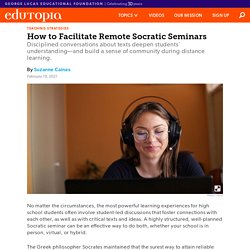
A highly structured, well-planned Socratic seminar can be an effective way to do both, whether your school is in person, virtual, or hybrid. The Greek philosopher Socrates maintained that the surest way to attain reliable knowledge was through the practice of disciplined conversation. He called this method dialectic—the art or practice of examining opinions or ideas logically, often by the method of question and answer, so as to determine their validity. Socratic questioning recognizes that questions, not answers, are the driving force in thinking. 6a5cc9 ed28b325ab6a4362b834f4bbf295d408. Three Strategies for Better Online Discussions. Express 9.14 - The Case for Debate: Intrinsic Motivation for Critical Thinking and Writing. The Case for Debate: Intrinsic Motivation for Critical Thinking and Writing Jon Kendall From the oration that convinced the Athenians to spare the rebellious people of Mytilene, to this month's oral arguments before the Supreme Court, debate has proven itself an indispensable form of truth-seeking and discernment.
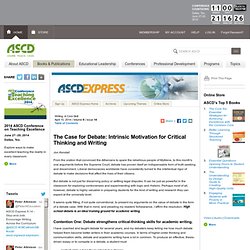
Liberal democracies worldwide have consistently turned to the intellectual rigor of debate to make decisions that affect the lives of their citizens. But debate is not just for discerning policy or settling legal disputes. It can be just as powerful in the classroom for exploring controversies and experimenting with logic and rhetoric. It seems quite fitting, if not quite conventional, to present my arguments on the value of debate in the form of a debate case. Key Strategies for Developing Oral Language. Being able to talk and express your thoughts clearly is vital in life.
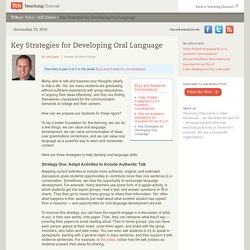
Yet, too many students are graduating without sufficient experience with group discussions, or arguing their ideas effectively, and they are finding themselves unprepared for the communication demands of college and their careers. How can we prepare our students for these rigors? To lay a better foundation for this learning, we can do a few things: we can value oral language development, we can value communication of ideas over grammatical correctness, and we can value oral language as a powerful way to learn and remember content. Here are three strategies to help develop oral language skills. Strategy One: Adapt Activities to Include Authentic Talk. Express 10.05 - Talking and Listening in Class. ASCD Express 13.05 - What Makes a Collaborative Classroom Work?
Edutopia. Over the years, I’ve worked to bring more of my students into the conversation, and doing so has become one of the most important ways I help my students develop essential communication and thinking skills. Discussion vs. Debate As in many aspects of teaching, I’ve learned that you can’t assume anything when it comes to students’ skills and knowledge, so I begin our pursuit of discussion with... a discussion. The class reflects on and talks about the following questions: “What’s the difference between a discussion and a debate? What is the purpose of each?” Students are quick to realize that the goal in a debate is to win an argument, but when it comes to identifying what people in a discussion are trying to do, they struggle a bit.
We establish a simple list of guidelines for effective discussions and spend some time practicing them. Fishbowl is one technique I’ve found that works well with my less experienced students. Inviting Quiet Students Into the Discussion. Strategies For Engaging Students. Dos and Don'ts for Good Discussions.
Presentations. How can I form strong guiding questions? 27268656 183a 4cd7 b1c8 b5f5a790ef53 Tool EssentialQuestions. Simple Rubrics for Common Core Speaking and Listening Standards - Teaching the Core. One search term that seems to regularly bring folks to the Teaching the Core blog is “speaking and listening rubric for Common Core State Standards.”
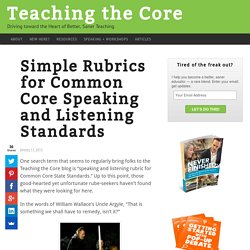
Up to this point, those good-hearted yet unfortunate rube-seekers haven’t found what they were looking for here. In the words of William Wallace’s Uncle Argyle, “That is something we shall have to remedy, isn’t it?” Uncle Argyle’s accent rocks. While my speaking and listening rubrics for the CCSS aren’t going to win me a gold star in an Ed Theory class, they do effectively tell me whether my students have it, are on the way to getting it, or are showing no evidence of getting it. In other words, they may not be sexy, but they work. For any graded debate or discussion, I give the students one skill from the Speaking and Listening standards that I want them to focus on. I tell students that I want to see all of the skills on the slide, but the one with the arrow is what I’ll be grading for. What classes do you do this in? Not at all. Speaking & Listening » Grade 9-10. The CCR anchor standards and high school grade-specific standards work in tandem to define college and career readiness expectations—the former providing broad standards, the latter providing additional specificity.
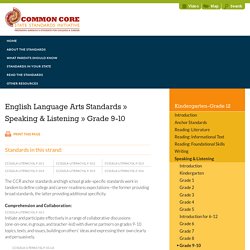
Comprehension and Collaboration: CCSS.ELA-Literacy.SL.9-10.1Initiate and participate effectively in a range of collaborative discussions (one-on-one, in groups, and teacher-led) with diverse partners on grades 9-10 topics, texts, and issues, building on others' ideas and expressing their own clearly and persuasively. CCSS.ELA-Literacy.SL.9-10.1.aCome to discussions prepared, having read and researched material under study; explicitly draw on that preparation by referring to evidence from texts and other research on the topic or issue to stimulate a thoughtful, well-reasoned exchange of ideas.
CCSS.ELA-Literacy.SL.9-10.3Evaluate a speaker's point of view, reasoning, and use of evidence and rhetoric, identifying any fallacious reasoning or exaggerated or distorted evidence.